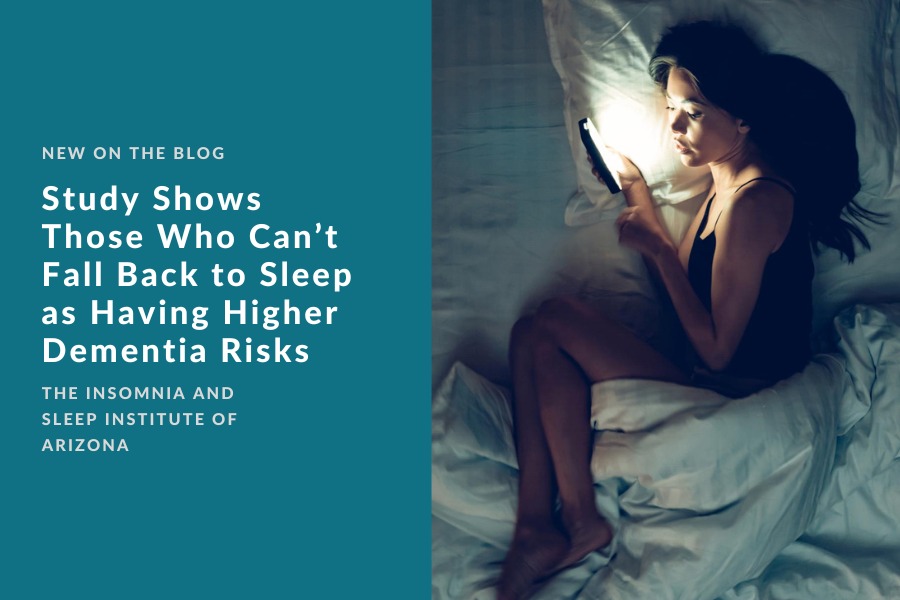Insomnia can be acute or chronic, and even though acute insomnia (like jet lag) can severely negatively affect your day, chronic insomnia comes with many other risks. One of the most common sleep disorders we treat at The Insomnia and Sleep Institute of Arizona is insomnia. Our unprecedented staff includes a clinical psychologist focused on cognitive therapy for insomnia (CBT-I) since this is a holistic, non-medicated form of insomnia management suitable for all. Still, insomnia sleep management is not inherently a one-size-fits-all approach. If you or your child struggles with getting enough quality sleep, it’s time for professional intervention. We are proud to serve you as the Face of Sleep Medicine in Arizona.
“Insomnia,” whether acute or chronic, can present in a myriad of ways. Two of the most common issues include challenges falling asleep as well as a tendency to wake up in the middle of the night (perhaps numerous times) and then struggling to fall back to sleep. Is one “worse” than the other? According to a recent study published in the American Journal of Preventative Medicine, people who have “sleep-maintenance insomnia,” which is defined as having trouble falling back asleep after waking up, have lower odds of developing dementia. To define “trouble” getting back to sleep, the researchers defined it as taking more than 30 minutes to go to sleep. Additionally, those who depend on sleep medication to help with insomnia were shown to have a higher dementia risk.
Insomnia and You
The investigators were not surprised that those with insomnia in general have a higher risk of developing dementia. That has been a known risk for some time. However, they were surprised that those exclusively with sleep-maintenance insomnia had a lower risk than their counterparts. According to the lead researcher, “We expected sleep-initiation insomnia [trouble falling asleep initially] and sleep medication usage to increase dementia risk, but we were surprised to find sleep-maintenance insomnia decreased dementia risk.” For this researcher, the study was personal. “My father has been experiencing chronic sleep disturbances since the COVID-19 pandemic began,” he explains. “I was concerned how this would affect his cognition in the future.”
The researcher looked into current literature on the issue and the findings he uncovered were mixed. There was no clear answer to which kinds of insomnia might affect dementia. This study is the very first to look at how long-term sleep disturbance (via insomnia) might be connected to risk of dementia on a national scale, considering older adults as the subjects. There has been previous analysis on REM sleep behavior, how sleep deprivation affects people, and the usage of benzodiazepines in relation to cognitive decline. Previously, a handful of smaller studies did look at sleep-maintenance insomnia effects.
Getting the Sleep You Need
Researchers looked at 10 annual waves, from 2011 – 2020, of data from the National Health and Aging Trends Study. This is a longitudinal panel that gathers information nationally on Medicare users who are 65+. Just two of the people included in this study did not have dementia in 2011. There are different types of dementia, but none have a cure. The current use of medications to help with this debilitating condition has had “limited success” according to the research team, so preventative measures are essential. One of those preventative measures can and should be getting help with insomnia.
The researcher says, “By focusing on the variations in sleep disturbances, our findings can help to inform lifestyle changes that can reduce dementia risk.” The exact mechanism for a lower dementia risk for those with sleep-maintenance insomnia still is not exactly known, but these researchers think that if you take part in activities that nourish cognitive reserve, you may be able to decrease dementia odds.
Overall, there are more sleep disturbances—including insomnia—in older adults than any other demographic. “Older adults are losing sleep over a wide variety of concerns,” warns the team. “Our findings highlight the importance of considering sleep disturbance history when assessing the dementia risk profile for older adults.” Still, more research is needed to see how manifestations and causes are affecting dementia risks. Future research should also focus on different types of dementia and sociodemographic differences. If you are struggling with insomnia, get help today. Contact The Insomnia and Sleep Institute by calling the office or completing the online contact form.





